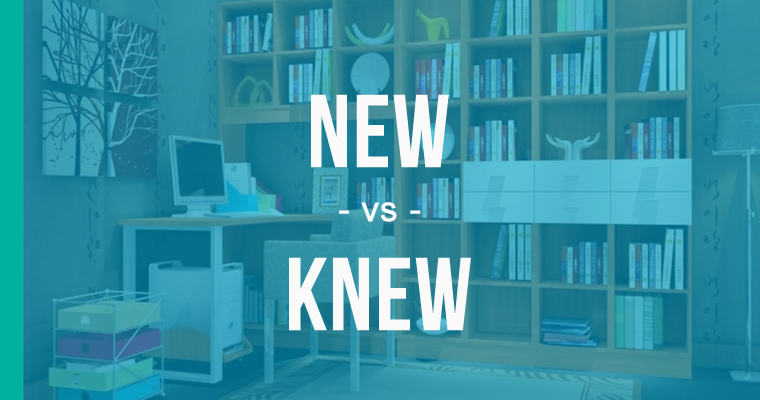New or Knew – How to Use Each Correctly

What’s the Difference Between Knew and New?
Contents
Knew and new are homophones. They sound exactly alike, but have different meanings and spellings.
New is an adjective that means the opposite of old.
- Tomorrow is a new day!
Knew is the simple past tense form of the verb know. The k in this word is silent.
- He knew he had made a mistake as soon as he said it.
Let’s look at some of the ways to use these words in English.
Using New in a Sentence
When to use new: New is an adjective that describes something existing for the first time.
For example:
- The Smiths just had a new baby!
- I’m looking for something new to read.
There are many expressions and idioms that use the word new. Some of them can be found below.
- brand new: extremely new
- Did you hear the pop singer’s brand new song? She just released it a few minutes ago!
- new blood: a person with fresh perspectives and ideas
- This company needs some new blood. Most of the people here have been here for years and have lost the ability to think creatively.
- to be as good as new: to be old yet seem new
- I fixed your shoes for you. Now they’re as good as new!
- to breath new life into: to rejuvenate
- Her meditation retreat breathed new life into her.
- to turn over a new leaf: to start fresh
- After being released from jail, the former prisoner wanted to turn over a new leaf and leave his life of crime behind him.
New can refer to something either concrete or abstract.
For example:
- A new car. (concrete)
- A new idea. (abstract)
Using Knew in a Sentence
When to use knew: Knew is the simple past tense form of the verb know. It means to be certain about information or to be acquainted with a person or thing.
For example:
- I knew him as a child. We both attended the same school.
- The judge knew the accused man was lying based on the evidence presented by the lawyers.
There are many idioms and expressions that use knew. Some of these are included below:
- to know which way the wind blows: to understand how a situation will develop and conclude
- They were going to fire me soon, so I was already applying to and interviewing for other jobs. I knew which way the wind blew.
- the next thing one knew: all of a sudden
- I was walking along completely peacefully. The next thing I knew, a mugger was stealing my purse!
- to know every trick in the book: to know all the ways to do something, especially in clever or shrewd ways
- He never went to university, but he knew every trick in the book. That helped him become a successful businessman.
- to know full well: to know something completely and without any confusion
- He said he broke my glasses on accident, but he knew full well that he was trying to break them on purpose.
- to know for a fact: to know something is completely true
- You say the earth is flat but I know for a fact that it is round.
Another way to describe the meaning of knew is to have been cognizant of.
Remembering New vs. Knew
One way to help you remember when to use knew and new is to use their spellings.
Knew starts with a silent k, just like the noun knowledge. Both knew and knowledge relate to the mind and its thoughts.
New shares the first three letters as news. News media reports on new and current events.
Outside Examples
- A 10-year-old who reeled in a giant carp says he knew it was a record contender before he ever got it ashore. Weighing in at 33.25 pounds, Chase Stokes’ fish did indeed set a state record in Vermont. –Houston Chronicle
- They have not elaborated on how Cornell-Duranleau or Lathem knew Warren, or if Warren knew them before he arrived in the United States. –LA Times
- New details are emerging about how authorities found the two men wanted in connection with last week’s brutal stabbing death of a 26-year-old Chicago man. –Chicago Sun Times
- The Illinois Lottery announced Friday that it will hold a public hearing Aug. 14 to showcase plans by the new firm that could take over managing a lottery that has struggled in recent years with sluggish sales and controversy surrounding how its run [sic] games. –Chicago Tribune
Quiz: Knew vs. New
Select the correct word, knew or new, to fill in the blank.
- Did you get a __________ haircut?
- Most people buy a __________ mattress every ten years or so.
- The hero ______________ he couldn’t defeat the villain, but he decided to try anyway.
- She ___________ it was wrong but she did it nevertheless.
See answers below.
Article Summary
Should I use new or knew? Despite having the same pronunciation, these two words have no overlap in meaning.
- Knew is the past tense form of know and relates to knowledge.
- New is an adjective that refers to something that only recently came into existence.
Use the information in this article to ensure you don’t mix up these two words.
Answers
- new
- new
- knew
- knew
